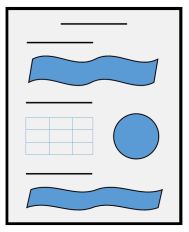UW EXP is a student health and wellness study. It is a sister study to Life@CMU, the StudentLife study at Dartmouth, and the LifeSensing consortium. We use surveys and biometrics (phone and Fitbit data) to learn about how personal and academic stressors affect student wellness. This annual study adds to the growing field of biometric research. Our goal is to guide University of Washington students and administration in addressing student stress and mental health to improve the Husky Experience.

The burden of discrimination, financial stress, and other adversity is real. Our findings show how important support is in dealing with these stressors. At the University of Washington, students can find support by joining student groups and accessing resources for health and wellness, academic support, and financial aid.
THE TOP FIVE RESEARCH QUESTIONS UW EXP IS INVESTIGATING:
1. How do stressors impact behavior?
To address stress, we need to understand how it impacts students. What mechanisms (e.g. emotional, social, cognitive) and behaviors (e.g. sleep, exercise, drug use) link stress to student outcomes such as mental health and academic performance?
Our findings show that social support helps reduce negative impacts of stress on mental health.
2. Can biometric data track changes due to stressors?
The granularity of the data we study is much higher with biometric data than self reports. Can biometric data be used to detect changes in mental health due to stressful events?
Our research shows that reduced sleep and increased time on screens are associated with stress.
3. How do stressors such as discrimination impact women and minorities
College can be very stressful, especially for students who have experienced adversity or encounter harassment or discrimination. What are the psychological and social impacts of stressful experiences for students in the short and long term?
You are not alone if you find school to be stressful.
4. How can UW help reduce the impact of stress on students?
To help students, we need to know more about what protects students from the harmful impacts of stressors and how the University can aid in this process. For example, how do university programs, club membership, and admission to major make dealing with stress harder or easier?
If you are struggling with school stress, reach out here for academic support or here for health resources.
5. What measurable effects does adversity have on student wellness?
Not all students arrive at UW with the same experience or have the same stressors to face. Some students deal with cumulative adversity (e.g. discrimination, trauma, and major life events). Can this be detected from phone data and wearable sensors? How does it impact the student experience and student outcomes?
Click below to learn more about the UW EXP Study!

A Tech-Forward Approach
UW EXP uses data from surveys, phones, Fitbits, and more to capture a comprehensive understanding of the UW student experience.

News and Publications
UW EXP is publishing our findings on how physical activity and sleep duration change when students report events of unfair treatment.

Overview of Findings
UW EXP is analyzing data from Spring of 2018, 2019, 2020 and (soon) 2021 to understand who reports discrimination and how micro-climates in the College of Engineering may correlate with lower stress and depression.
Funding
The UWEXP study is an expensive study to run. Our funders have been crucial to our success. Currently, the study is funded by internally by the College of Engineering (including the Department of Electrical and Computer Engineering and the Allen School of Computer Science and Engineering), Population Health Initiative, and Alcohol and Drug Abuse Institute. In addition, we have funding from the National Science Foundation; Samsung Advanced Institute of Technology; and Google.
Dr. Jennifer Mankoff, Principal Investigator
Eve Riskin, Co-Investigator
Paula Nurius, Co-Investigator
Margie Morris, Co-Investigator
Pamphlet compiled by Addie Bjornson
Anind Dey, Co-Investigator
Han Zhang, Graduate Student
Yasaman Sefidgar, Graduate Student
Orson (Xuhai) Xu, Graduate Student

